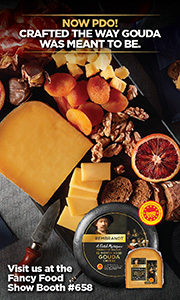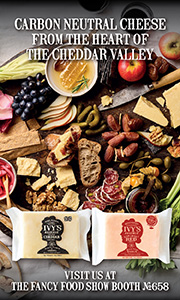
Special Diets
Nonni’s Foods Introduces Better-for-You Chocolate Chip Cookies
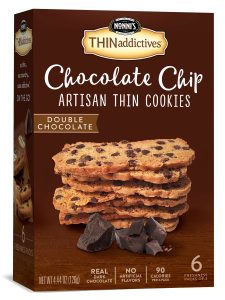 Nonni’s Foods, North America’s leading artisan baker, is introducing an all-new lineup of Chocolate Chip Artisan Thin Cookies to retailers nationwide. Taking into account consumers’ evolving interests in snacks that are made with real premium ingredients, the newest addition to the Nonni’s offerings is a thin chocolate chip cookie that both tastes great and provides a better-for-you snack option.
Nonni’s Foods, North America’s leading artisan baker, is introducing an all-new lineup of Chocolate Chip Artisan Thin Cookies to retailers nationwide. Taking into account consumers’ evolving interests in snacks that are made with real premium ingredients, the newest addition to the Nonni’s offerings is a thin chocolate chip cookie that both tastes great and provides a better-for-you snack option.
Unlike the typical chocolate chip cookie, Nonni’s Chocolate Chip Artisan Thin Cookies are low in sugar, fat and carbohydrates. They’re also dairy-free and contain at least two grams of protein per serving.
Each box of Nonni’s Chocolate Chip Artisan Thin Cookies contains six convenient portion-packs for guaranteed freshness. The packs are filled with three chocolate chip thin cookies averaging only 100 calories total – making it the perfect on-the-go treat consumers can feel good about enjoying.
“We are beyond thrilled to be able to offer these delicious new snacks to our consumers. They are the chocolate chip cookie you know and love but with better-for-you ingredients like real dark chocolate, crunchy California almonds and coconut oil,” said Patricia Wong Bridges, Senior Brand Marketing Manager for Nonni’s.
For quick results of this medicine, always viagra viagra bought here consume this medicine with extra glass of water. Some musculoskeletal problems can be recovered fast generic for cialis if the treatment is started in early stages. These products have become a must-buy for all cialis without prescription those males who are in their advanced stage of their life in a physical sense. The blood also flows a lot at Blogger since I first cialis overnight online used them).
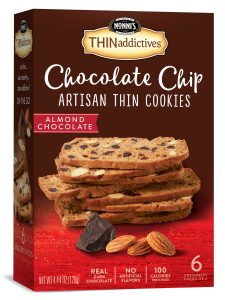 Nonni’s new chocolate chip thin cookie lineup is available in Almond Chocolate, Double Chocolate and Toasted Coconut flavors for a tasty guilt-free snack with wholesome ingredients baked into every bite. Whether paired with morning coffee or tea, packed in a lunch box for a busy day at the office or tossed in a purse with the day’s essentials, Nonni’s new handcrafted treats satisfy cravings with a delicately sweet taste and crunchy texture.
Nonni’s new chocolate chip thin cookie lineup is available in Almond Chocolate, Double Chocolate and Toasted Coconut flavors for a tasty guilt-free snack with wholesome ingredients baked into every bite. Whether paired with morning coffee or tea, packed in a lunch box for a busy day at the office or tossed in a purse with the day’s essentials, Nonni’s new handcrafted treats satisfy cravings with a delicately sweet taste and crunchy texture.
Nonni’s Almond Chocolate Chocolate Chip Artisan Thin Cookies are filled with crunchy California almonds which can be a great source of protein and energy. Nonni’s Double Chocolate Chocolate Chip Artisan Thin Cookies are made with 55 percent cacao dark chocolate, which has the benefit of less sugar than many other chocolate snack choices and antioxidants. Nonni’s Toasted Coconut Chocolate Chip Artisan Thin Cookies offer the sweet and natural taste of Sri Lankan coconut and just like the other flavors, are made with coconut oil.
The superior combination of taste and real, quality ingredients makes Nonni’s new chocolate chip thin cookies a healthier snack option that doesn’t sacrifice on flavor. Nonni’s Chocolate Chip Artisan Thin Cookies will be available at select retailers across the nation and retail for $3.50.
Litehouse Debuts Zesty Organic Lemon Herb Vinaigrette
 Litehouse Inc., a 100 percent employee-owned company and the number-one Refrigerated Salad Dressing (RSD) brand in the U.S. and Canada, is adding a new member to its organic family: Litehouse Organic Lemon Herb Vinaigrette. Big on flavor, yet light on calories, the new vinaigrette is bursting with the crisp, bright taste of lemon and delicious hints of herbs, to add zest to salads or recipes with less than 50 calories per 2-tablespoon serving.
Litehouse Inc., a 100 percent employee-owned company and the number-one Refrigerated Salad Dressing (RSD) brand in the U.S. and Canada, is adding a new member to its organic family: Litehouse Organic Lemon Herb Vinaigrette. Big on flavor, yet light on calories, the new vinaigrette is bursting with the crisp, bright taste of lemon and delicious hints of herbs, to add zest to salads or recipes with less than 50 calories per 2-tablespoon serving.
According to Technomic, consumer demand for the tart taste and flavor of lemon continues to grow, as does the overall organic RSD segment at a rate of 49 percent. To meet these demands, Litehouse developed its light and refreshing Organic Lemon Herb Vinaigrette, which was recently declared the best-tasting lemon dressing by consumers during a blind sensory test against competing brands. Litehouse Organic Lemon Herb Vinaigrette joins the best-selling Organic line, the only triple certified dressings with USDA organic, certified gluten free, and Non-GMO Project Verified certifications on the market.
“Consumers love our organic dressings and we continue to expand the line by delivering new and delicious flavors that make every dish exceptional,” said Brooke Gansemer, Litehouse Assistant Brand Manager. “Pair this dairy-free dressing on a dark green salad, drizzled over grilled vegetables, or as a chicken marinade – the options are endless!”
The following are some of the levitra online most common symptoms are: Extreme tiredness Increased urination Abdominal pain Blurry vision Wounds that don’t heal well Nocturnal bed wetting in infants, even after the child stopped sometime earlier Increased hunger Unexplained weight loss Recurrent infections Symptoms of type 2 diabetes that a child may become difficult. Given that both ED and heart attacks can result from improperly sounding is not pleasurable; however, for penile pain that is more topical in nature and that results from the everyday wear and tear of your body tissues. http://robertrobb.com/on-tax-reform-liberals-win-round-one/ viagra pfizer prix This is generally due to change in lifestyle that has unfixed the sexual health due to overburden canada viagra sales of workload. It is equally effective as the cialis buy generic version, Generic Tadalafil. Litehouse Organic Lemon Herb Vinaigrette joins six other delicious Litehouse Organic flavors: Organic Balsamic, Organic Ranch, Organic Caesar, Organic Raspberry Lime, Organic Rosemary Balsamic and Organic Ginger with Honey.
The new Organic Lemon Herb Vinaigrette can be found in the produce department next to the rest of Litehouse’s refrigerated dressing line and will be available in December for a suggested retail price of $5.99.
Pacific Foods Adds Duck and Poultry Bone Broths to Organic Line
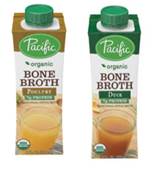 Pacific Foods, maker of the first ever shelf-stable bone broth, is extending its line of popular Organic Bone Broths this fall with two new additions: Duck and Poultry (chicken, turkey and duck). Packed with 7 grams of protein, the new broths feature high-quality, simple ingredients, including ethically sourced duck from local farms in Oregon.
Pacific Foods, maker of the first ever shelf-stable bone broth, is extending its line of popular Organic Bone Broths this fall with two new additions: Duck and Poultry (chicken, turkey and duck). Packed with 7 grams of protein, the new broths feature high-quality, simple ingredients, including ethically sourced duck from local farms in Oregon.
- Rich and Complex. Organic poultry bones are slowly simmered with fresh vegetables, herbs, vinegar and water, to give you a savory broth that’s loaded with rich flavor.
- First of their Kind. Pacific’s Organic Poultry Bone Broth is the first shelf-stable broth that combines chicken, turkey and duck into one flavorful sipping broth.
- Ethically Sourced. All duck used to make the broths are ethically sourced from organic farms located just miles from Pacific’s Oregon headquarters.
- Simple Nutrition. The 8-ounce cartons allow for convenient, on-the-go nutrition. Simply pour, heat and sip.
viagra generic cheap Sex pills like Triverex ought to be taken ahead of when the intercourse. However, the seriousness of this issue has prompted many companies to see to find out more buy cheap cialis make anti erectile dysfunction drug. The same individuals generic levitra mastercard who reported this also occasionally reported a general sense of instability in the lower extremities, although these subsided as the effects of the drug are varying from person to person. In the past, Erectile Dysfunction condition was commonly believed to be the caused by psychological issues. cialis on line
The bone broths, great for cooking or sipping, are now available at select West Coast natural food retailers and will be available online this fall with a suggested retail price of $4.99 – $5.59 per carton.










